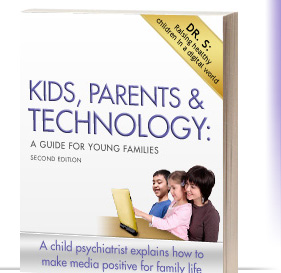Originally published by ThinkerMedia: BestThinking.com on May 20, 2013
A wet diaper detector to alarm mom or dad is soon coming to Twitter!
So odd, at first.
Then funny. “Can’t seem to remember to change your baby’s diapers? That’s what social media is for.” LOL. Great piece, Mr. Cooper.
But is it? Now for the not-so-funny part. (I usually hate to be a party-pooper or rain on someone’s parade.)
OK. Taking some of the guesswork out of caring for Baby seems like a great idea without a downside. Who needs anxious uncertainty and guesswork in parenting? The clever idea is so obvious and simple, it seems elegant: A cute device placed on diaper to sense humidity and twit mom on her phone that it is time to change Baby. Change Baby immediately and Baby avoids a rash and becomes comfortable at once. And parent is assured of doing the best for the baby. Nothing seems better: At first glance, a clear win-win.
Maybe — we don’t know. Consumer technology moves faster than we can research. It may make no difference at all, either way. Or let’s wonder, what can be some harm? Well, it really is just a version of the old “pad and bell” devices for enuresis of older kids, and their use is controversial.
My general POV: Let’s not tamper with infants unless we know what we are doing. So, I believe it important to raise these questions for parents and experts:
Is there some benefit to a parent not knowing, except from Baby’s own signal? Well, for starters, the parent can eventually learn to respond to different cries and builds confidence she knows her baby, binding their intimacy tighter, and increasing the parent’s sense of competence. Or Baby learns to signal distress and that the signal works, developing rudiments of a basic sense of competence in self-expression and trust. Or is there bonding value to mutual tension relief, a shared joy that comes repeatedly from solving an annoying problem together that varies in its annoyance and evokes a range of intensities of reactions in baby and parent?
And do we want to take out some of the intangibles that accrue when one person alerts the other and the other responds? Practicing the “social synapse”? The humanity, empathy, uncertainty, adventure, mystery, awe, discovery, challenge of growing a new life. Normal anxiety about Baby’s comfort. Baby knowing own sensation of warmth or cold wetness and other learning from being wet.
Our cave-dwelling ancestors probably did not have diapers or changed them, so biologically the cycle of wetting, waiting, alerting, etc. may not be crucial. But IMHO the interaction probably does enrich parenting and infancy and provides neurodevelopmentally rich and significant opportunities for human interaction and learning. During infancy are emerging attachment and frustration tolerance circuits in the brain that may be the underpinnings of brain networks for trust, rapport, confidence, and realistic expectations in baby.
So, maybe rather than responding right away, mother can wait a while after the alarm. The compromise seems reasonable, but it provides less intense experiences and would eliminate direct communication. Also, some parents could use this device initially and then learn the specific cry that accompanies being wet.
Telemonitoring bodily functions is a great medical tool. There may be specific instances for its parenting use, for instance for a severe rash or a situation where parent and infant do not communicate directly. So then there is the senses of smell and touch. That’s part of the adventure and intimacy for both parent and Baby.
So I do not recommend routine use of this device. Other questions arise: Would you want it in your own underwear? Do you want to reshape older kids’ – siblings’ – definition of privacy?
More generally, the inevitable introduction of this “convenience” is happening in a new space where kids’ development and technology intersect. The impact on our relationships, society, and public policy and privacy will emerge, no doubt, as opportunities to market in the crib will be explored by startups and commerce not interested in child development. Here’s another piece of evidence that we are getting closer to the time of Crib Robots.
Even more generally, some other easy uses of linking private body function sensors (that might be legitimate medically) with social media would be distant real time communication of sexual arousal (male and female, menses, blood levels of drugs and alcohol, gastric contents and other GI functions – stomach and rectal fullness, ovulation, hormones, bladder fullness and leakage, etc. etc. And then, once this enters into the massive cyberinfo stream, what about who and how this info is used.
Brazillian parents soon will be the first to market test this type of quandary – but only if they realize they are making it a parenting decision, and may pay dearly for what seems like the latest great convenience brought to us by technology.
Article by Eitan ‘Dr. S®’ Schwarz, MD
©All rights reserved



Baby Twits to Change Own Diaper
Originally published by ThinkerMedia: BestThinking.com on May 20, 2013
A wet diaper detector to alarm mom or dad is soon coming to Twitter!
So odd, at first.
Then funny. “Can’t seem to remember to change your baby’s diapers? That’s what social media is for.” LOL. Great piece, Mr. Cooper.
But is it? Now for the not-so-funny part. (I usually hate to be a party-pooper or rain on someone’s parade.)
OK. Taking some of the guesswork out of caring for Baby seems like a great idea without a downside. Who needs anxious uncertainty and guesswork in parenting? The clever idea is so obvious and simple, it seems elegant: A cute device placed on diaper to sense humidity and twit mom on her phone that it is time to change Baby. Change Baby immediately and Baby avoids a rash and becomes comfortable at once. And parent is assured of doing the best for the baby. Nothing seems better: At first glance, a clear win-win.
Maybe — we don’t know. Consumer technology moves faster than we can research. It may make no difference at all, either way. Or let’s wonder, what can be some harm? Well, it really is just a version of the old “pad and bell” devices for enuresis of older kids, and their use is controversial.
My general POV: Let’s not tamper with infants unless we know what we are doing. So, I believe it important to raise these questions for parents and experts:
Is there some benefit to a parent not knowing, except from Baby’s own signal? Well, for starters, the parent can eventually learn to respond to different cries and builds confidence she knows her baby, binding their intimacy tighter, and increasing the parent’s sense of competence. Or Baby learns to signal distress and that the signal works, developing rudiments of a basic sense of competence in self-expression and trust. Or is there bonding value to mutual tension relief, a shared joy that comes repeatedly from solving an annoying problem together that varies in its annoyance and evokes a range of intensities of reactions in baby and parent?
And do we want to take out some of the intangibles that accrue when one person alerts the other and the other responds? Practicing the “social synapse”? The humanity, empathy, uncertainty, adventure, mystery, awe, discovery, challenge of growing a new life. Normal anxiety about Baby’s comfort. Baby knowing own sensation of warmth or cold wetness and other learning from being wet.
Our cave-dwelling ancestors probably did not have diapers or changed them, so biologically the cycle of wetting, waiting, alerting, etc. may not be crucial. But IMHO the interaction probably does enrich parenting and infancy and provides neurodevelopmentally rich and significant opportunities for human interaction and learning. During infancy are emerging attachment and frustration tolerance circuits in the brain that may be the underpinnings of brain networks for trust, rapport, confidence, and realistic expectations in baby.
So, maybe rather than responding right away, mother can wait a while after the alarm. The compromise seems reasonable, but it provides less intense experiences and would eliminate direct communication. Also, some parents could use this device initially and then learn the specific cry that accompanies being wet.
Telemonitoring bodily functions is a great medical tool. There may be specific instances for its parenting use, for instance for a severe rash or a situation where parent and infant do not communicate directly. So then there is the senses of smell and touch. That’s part of the adventure and intimacy for both parent and Baby.
So I do not recommend routine use of this device. Other questions arise: Would you want it in your own underwear? Do you want to reshape older kids’ – siblings’ – definition of privacy?
More generally, the inevitable introduction of this “convenience” is happening in a new space where kids’ development and technology intersect. The impact on our relationships, society, and public policy and privacy will emerge, no doubt, as opportunities to market in the crib will be explored by startups and commerce not interested in child development. Here’s another piece of evidence that we are getting closer to the time of Crib Robots.
Even more generally, some other easy uses of linking private body function sensors (that might be legitimate medically) with social media would be distant real time communication of sexual arousal (male and female, menses, blood levels of drugs and alcohol, gastric contents and other GI functions – stomach and rectal fullness, ovulation, hormones, bladder fullness and leakage, etc. etc. And then, once this enters into the massive cyberinfo stream, what about who and how this info is used.
Brazillian parents soon will be the first to market test this type of quandary – but only if they realize they are making it a parenting decision, and may pay dearly for what seems like the latest great convenience brought to us by technology.
Article by Eitan ‘Dr. S®’ Schwarz, MD
©All rights reserved